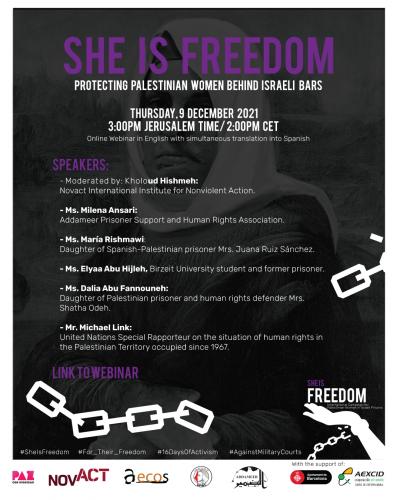
On 9 December 2021, to commemorate the International Day for the Elimination of Violence against women, and in line with the annual international campaign of 16 Days of Activism Against Gender-Based Violence, Addameer Prisoner Support and Human Rights Association, the International Institute for Nonviolent Action (NOVACT), and the Union of Palestinian Women’s Committees (UPCW) hosted a webinar titled, “She is Freedom: International Campaign for Palestinian Women in Israeli Prisons.”
The webinar, moderated by Kholoud Hishmeh from NOVACT, brought together former Palestinian female prisoner and Birzeit University student Elyaa Abu Hijleh, the daughters of Palestinian female prisoners, including Maria Rishmawi and Dalia Abu Fannouneh, and Addameer International Advocacy Officer Milena Ansari, and UN Special Rapporteur on the situation of human rights in the Palestinian territory occupied since 1967 Michael Lynk to examine the harsh detention conditions Palestinian women face inside Israeli prisons amid the Israeli occupation’s systematic arbitrary arrest and incarceration of thousands of Palestinian political prisoners.
No Palestinian is exempt from Israeli occupation’s arbitrary arrest and detention policy, intimidation, punishment, threats, and even torture and ill-treatment while in custody, regardless of gender or age. Palestinian female detainees in Israeli prisons and detention centers represent all facets of society. In the occupation prisons, there are women parliamentarians, teachers, students, activists, social and political leaders, feminists, journalists, mothers, and daughters, merely for exercising their fundamental civil and political rights and voicing opposition against Israel’s colonization and apartheid regime, embodied in a myriad of unjust policies and measures against Palestinians.
Palestinian women are subjected to many forms of physical and psychological ill-treatment throughout the process of their arrest leading up to their incarceration. The Israeli Occupation Forces brutally arrest Palestinian women during night raids, snatching many from their children and families. During interrogations, the Israeli occupation authorities subject Palestinian women to extremely humiliating interrogation techniques and deprive them of their basic necessities and needs, often using them as leverage.
Former Palestinian female prisoner and Birzeit University law student Elyaa Abu Hijleh recounted her own arbitrary arrest by Israeli occupation forces that came on the heels of a mass arrest campaign of Palestinian leftist student activists in July 2020. She especially noted the harsh detention conditions that were compounded upon under the pretext of COVID-19 regulations, such as the incarceration of Palestinian female detainees in Hasharon Prison in solitary confinement cells for over two weeks in deleterious conditions as a “quarantine” measure. In her 11 month sentence, she was only able to see her mother twice due to arbitrary COVID-19 regulations imposed by Israeli occupation authorities banning the majority of family visits, in addition to poor-quality ‘virtual’ court sessions exacerbating lacking fair trial standards and preventing detainees’ contact with families and lawyers. Further, Elyaa emphasized the complete lack of feminine hygiene products in Hasharon Prison, the constant surveillance and cameras in each cell, and the routine and unannounced presence of Israeli male prison guards, all of which violate female detainees’ privacy, particularly for Palestinian women who wear the headscarf.
While Maria Rishmawi, daughter of Spanish- Palestinian prisoner Mrs. Juana Ruiz Sanchez, explained about her mother's detention and interrogation conditions. She expressed the difficulty and lack of communication with her mother while in detention, and the hardship of not being able to know more about her mother's conditions inside Damon prison.
Dalia Abu Fannouneh, daughter of human rights defender and director of the Health Work Committees (HWC), Shatha Odeh, discussed the painful and difficult emotions of the family members of Palestinian female prisoners. She recounted the arbitrariness and cruelty of her mother’s arrest, whereby Israeli Occupation Forces (IOF) stormed their house under the pretext of taking away her mother for “questioning,” only to later arrest and charge her. Shatha Odeh was detained for 20 days in Hasharon Prison under extremely harsh conditions lacking minimum living conditions, before being transferred to Damon Prison.
UN Special Rapporteur Michael Lynk began by repudiating the Israeli occupation’s arbitrary criminalization, on 22 October 2021, of six leading Palestinian civil society and human rights organizations. Prof. Lynk further details the three gross violations of International Humanitarian Law (IHL) committed by Israel as the Occupying Power against Palestinian prisoners, legally a protected class under international law. They include: (1) the systematic and illegal policy of administrative detention without charge or trial, (2) the absence of fair and regular trials, and (3) the illegal transfer of imprisoned protected persons to the territory of the Occupying Power.
Moreover, Milena Ansari emphasizes that it is not only the Israeli occupation’s systematic and arbitrary incarceration, torture, and ill-treatment of Palestinian prisoners, nor only the absence of free and fair trials under the Israeli military judicial system, but that even the basis of military orders that criminalize and touch upon almost all facets of Palestinian life that renders it illegitimate. She echoes Prof. Lynk’s note regarding the arbitrary criminalization of the six Palestinian civil society and human rights organizations, among them Addameer, and links it to the Israeli occupation’s criminalization of the HWC and subsequent arrest of its director Shatha Odeh.
Throughout the question and answer session following the panel, the speakers further elaborated various aspects, often gendered, of the Palestinian prisoners and female prisoners' experience. Each speaker also made clear the need for international solidarity and pressure on States and all other responsible parties to hold the Israeli occupation accountable for its crimes under international law.
For the full recording, watch here.